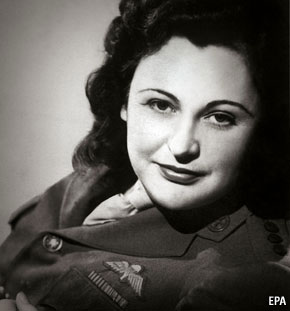Obituary;Nancy Wake;
訃告;南希·威克;
Nancy Wake—saboteur and special agent, died on August 7th, aged 98.
南希·威克——二戰(zhàn)間功勛卓越的英國間諜特工,8月7日去世,享年98歲。

Convivial, and not averse to a drink, Nancy Wake could often be found cheering up a cocktail bar. In the late 1940s, and again towards the end of her life, it might have been the American Bar of the Stafford Hotel, just across the road from The Economist’s offices in London. In 1940, when she was living as a newlywed in Vichy France, it could have been another American Bar, this one in the H?tel du Louvre et de la Paix in Marseilles. It was a chance encounter here with an English officer, interned by the French authorities but that day on parole, which led to her membership of the resistance, and then to her role as an agent of the British Special Operations Executive in occupied France. Of the 39 SOE women infiltrated into France, 11 of whom would die in concentration camps, she was perhaps the most redoubtable.
熱衷于聚會派對,從不拒絕美酒的南希·威克經(jīng)常出現(xiàn)在雞尾酒會。到她生命的最后一段時光也是如此,可能她就出現(xiàn)在倫敦《經(jīng)濟學(xué)家》雜志社辦公大樓對面的斯塔福耶酒店的美國酒館。上世紀(jì)40年代時亦是如此,1940年她剛剛結(jié)婚,嫁到維希政權(quán)下的法國,那時她經(jīng)常出現(xiàn)在另一家美國酒館,在巴黎盧浮旅館里或者在馬賽和平旅館里。在那里,她很偶然地碰到一位被法國當(dāng)局保釋的在囚英國軍官。 這位軍官后來帶領(lǐng)她加入了抵抗德國納粹的運動中,也使她成為了英國特別行動處駐占領(lǐng)的法國的一位特工。而在特別行動處39位滲入法國的女特工中,11名沒有在德國納粹集中營中喪生,而她也許是其中最令人敬畏的那個。
From her earliest days, Miss Wake combined opposing qualities. She was disciplined, but at the same time a free spirit. In Sydney, to which her large family had moved after leaving her birthplace in New Zealand, she twice ran away from home. As soon as she could, she made her way to London, then to Paris to work as a freelance journalist. There it was her cheerful independence as much as her good looks that caught the eye of the rich French industrialist, Henri Fiocca, who would take her to Marseilles as his wife.
早在還是個女孩的時候,威克身上就有了相反的特質(zhì)。她遵守紀(jì)律,同時卻又熱愛自由。她隨大家庭從家鄉(xiāng)新西蘭搬到悉尼后,就離家出走過兩次。她一長到足夠負(fù)擔(dān)自己的生活的年紀(jì),就自己去了倫敦生活,然后又到巴黎做了自由記者。她那值得慶賀的獨立以及她奪人眼球的美貌,捕獲了一位法國企業(yè)家亨利·費奧卡的心。隨后他們結(jié)了婚,來到了馬賽。
She enjoyed her new life of luxury while it lasted, but she was no flibbertigibbet. Soon after meeting the interned British officer, she was helping to get similar Allied airmen, refugees and escaped prisoners-of-war out of occupied France and into Britain. She took a flat, ostensibly for a lover, in fact for the resistance, sheltered men on the run and became a crucial part of the southern escape line to Spain, travelling all over southern France from Nice to Names to Perpignan, with clothing, money and false documents.
她很享受奢華的新生活,但她并不是那種只知享樂的膚淺的人。在她遇到那名被拘禁的英國軍官后不久,她就幫著將與他情況相似的盟軍飛行員、難民和在逃戰(zhàn)俘逃從被占領(lǐng)的法國轉(zhuǎn)移到英國。她買了棟公寓,表面上看是為了會情人用的,但實際上是為了庇護抵抗軍。她帶著衣物、錢和假造的公文,從尼斯到尼姆再到配里皮昂在法國南部來回奔走,成為法國南部向西班牙逃亡路線的一個關(guān)鍵部分。
Inevitably, she was arrested. Beaten up and questioned for four days, she revealed nothing. It was this steadiness and loyalty to her comrades that most appealed to the British officers who later agreed to train her to become an SOE agent.
不可避免地,她被逮捕了。敵人鞭打拷問了她四天,她卻什么都沒有泄露。正是這種堅持穩(wěn)定和對同志的忠誠打動了那位英國軍官,成為他后來同意將她訓(xùn)練為一名特別行動處特工的最重要原因。
Other qualities were evident by then. Her femininity was never in doubt. It helped her escape capture, not just because she could on occasion flirt her way out of trouble, but also because her Gestapo pursuers assumed any woman as skilful in evading them must be a butch matron (though because of her ability to scuttle off the Germans called her “the White Mouse”). When she was with the Maquis, silk stockings and Elizabeth Arden face cream were often dropped for her by parachute, along with Sten guns, radios and grenades. Yet she conformed to no stereotype, swearing in the vernacular in the coarsest of terms, living for months in the woods and fighting, in the words of a confrère, not like a man but “l(fā)ike five men”.
那時她的其它優(yōu)秀品質(zhì)也已經(jīng)非常明顯。她的女性魅力是毋庸置疑的。這幫助她成功逃離拘捕,并不只是因為他能偶爾靠美人計脫險,還因為她的那些蓋世太保追求者們認(rèn)為任何擅長回避他們追求的人必定是個男人婆 (不過因為她非常善于逃跑,德國納粹稱她為“白鼠”)。 在法國抗德游擊隊工作那會兒,組織經(jīng)常空降絲襪、伊莉莎白·雅頓的面霜,以及斯特恩式輕機關(guān)槍、收音機和手榴彈給她。然而,她絕不是一般的女人。她可以用最臟的法國方言罵人,她也可以在茂林作戰(zhàn)數(shù)月。用一位同事的話說,她根本不像一個男人,她“像五個男人”。
Her fearlessness seemed to come from a total lack of self-doubt. The certainty with which she held her beliefs—she hated the Nazis, having seen them whipping Jews in Vienna before the war, loved France and was intensely loyal to Britain—freed her of any sense of guilt. This in turn enabled her to act as though she were utterly innocent, even when claiming to be the cousin of an imprisoned Scottish captain, or chatting to a Gestapo officer with 200lb of illegal pork in her suitcase.
她的英勇無畏似乎因為她從不自我懷疑。她那種斬釘截鐵的確定和由此而來的信念——對戰(zhàn)前在維也納鞭笞猶太人的納粹的痛恨、對法國的熱愛以及對英國無比的忠誠——使她從不愧疚。因此,即使她公開撒謊自己是一名囚禁的蘇格蘭上校的表妹,或者是在包里藏著兩百磅非法豬肉與一名蓋世太保軍官交談,她也表現(xiàn)地底氣十足、氣定神閑。
It was sheer guts, though, that got her over the Pyrenees in her espradilles when the Germans were at her heels. And back in Britain in 1943 it was her character rather than her skills or physical abilities that got her through her training in grenade throwing, silent killing and parachute jumping. As for violence, she hated it—until she became hardened.
然而,完全是巨大的勇氣,使得她在德國納粹緊跟其后的情況下,穿著她那破舊的帆布鞋,穿越了比利牛斯山。而再往前,1943年在英國時,正是因為她的頑強的性格,而不是她的技術(shù)或身體素質(zhì),使她通過了扔手榴彈、無聲殺人和跳傘訓(xùn)練。她痛恨暴力,直到她變得無堅不摧。
That began in April 1944, when Captain (as she now was) Wake and another SOE agent were parachuted into the Auvergne in south-central France. Their immediate job was to work with the local Maquis to cause as much disruption as possible before D-day five weeks later. Now the fighting began, and Captain Wake showed herself more than willing to take part, readily joining raiding parties, blowing up local Gestapo headquarters and ambushing German patrols.
那是1944年4月,威克成為了上尉(到現(xiàn)在一直是),她和另外一位英國特別行動處特工空降在法國中南部的奧弗涅。他們當(dāng)時的任務(wù)是與當(dāng)?shù)氐目沟掠螕絷爢T一起,盡可能多地制造混亂,為五周后的諾曼底登陸做準(zhǔn)備。現(xiàn)在斗爭開始了,威克上尉顯然不只是要去參與其中,她自愿加入了突擊隊,端掉了蓋世太保的總指揮部,并突襲了德國巡邏兵。
She did not enjoy killing a German sentry with her bare hands, but she was unsentimental. Likewise, she saw the necessity of killing a German woman captured by some of her Maquis colleagues who admitted to being a spy. Though she had been raped and tortured, Captain Wake ordered her to be shot—or, if the captain’s later suggestion is to be believed, she herself shot her, since the Maquisards’ sense of honour permitted her rape but not her killing.
她不喜歡用徒手殺掉一名德國哨兵的感覺,但她并非冷血無情。同樣地,在與她共事的馬基隊員抓到一名承認(rèn)自己是名間諜的德國婦女時,她知道必須殺了她。盡管這女人已經(jīng)被強暴過、折磨過,威克上尉還是命令殺掉她。甚至,人們都不敢相信她后來這個提議:由她親手干掉她——因為法國抵抗成員的榮譽感使他們只允許自己強暴她,而不允許自己殺掉她。
In spite of such horrors, and in spite of such feats as bicycling over 500km in under 72 hours to find a radio operator, Captain Wake was having the time of her life. She was still only 26, a woman among 7,000 (mostly) admiring men, carrying out daily acts of derring-do and revelling in a job she had plainly been born for. Although she lived with the constant possibility of capture, it held no fear for her, and she did not yet know that her husband, rather than betray her, had been arrested by the Gestapo, tortured and killed. Decorations galore—from Britain, France, America and Australia—awaited her, but life would never be as good again.
盡管經(jīng)歷著類似的恐怖事件,盡管曾經(jīng)有過許多驚人壯舉,比如為尋找一個收音機操作員72小時內(nèi)騎車500公里,威克上尉依然享受著女人生命的黃金時光。她畢業(yè)是個26歲的年輕女性,軍營中的7000男人大多都是她的傾慕者。在這群男人中,每天英勇地執(zhí)行任務(wù),完全陶醉于這一她天生注定要從事的工作。盡管隨時都有可能被捕,她卻從不害怕。那時她還不知道,她的丈夫并不是背叛了她,而是被蓋世太保抓了起來,折磨致死。戰(zhàn)爭結(jié)束后,各種榮譽從英國、法國、美國和澳大利亞向她涌來,但她生命最美好的時光已一去不返。











